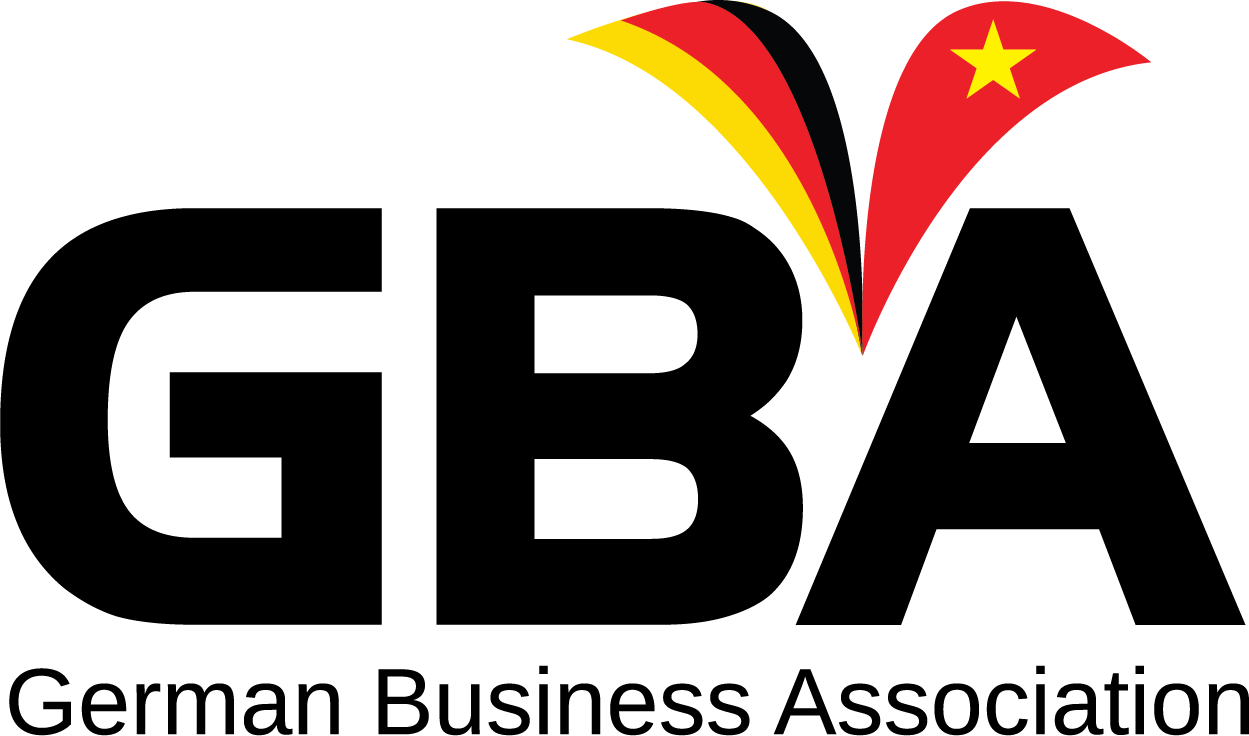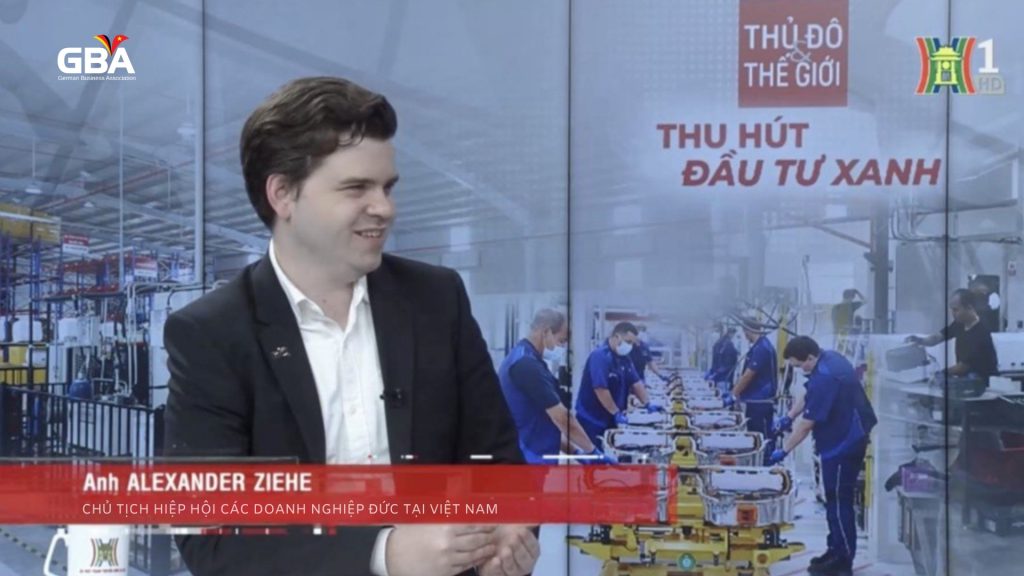Green, sustainable growth is the global economic goal. Vietnam is leading the charge with ambitious targets set for 2050, aiming to reduce net emissions to zero and increase the scale of the green economy from $6.7 billion in 2020 to $300 billion in the total national GDP. To reach these goals, Vietnam is focusing on policies to attract capital, particularly FDI for green development investment. For a deeper understanding of this journey, don’t miss the interview between Hanoi Television and the GBA Chairman, Mr. Alexander Ziehe. Discover the experiences of FDI businesses investing in Vietnam and learn about the current challenges in attracting green businesses to the country. Click here>>> to watch the full interview (in Vietnamese) or read the English summary below.
Question 1: In recent years, Vietnam is among the provinces and countries that are attractive to foreign investors. However, the number of green FDI projects is still quite modest. Do you think what could be the cause of this problem?
Answer: “First of all, it is clear that Vietnam is emerging as a very attractive destination for foreign capital, including Germany. We have more than 160 FDI projects here. If we look at this development, we will see that Vietnam is a very attractive destination even for green investments. It’s because many German investments right now have to fully comply with global regulations on green investment, carbon reduction and a series of other guidelines to aim for green investment. If you go into more detail, you will see that German investment projects have a lot of positive changes, because not only the recent investments, but also the old investments are being upgraded to meet the standards, such as Bosch Group has invested in a new solar power plant here.
Currently we have a lot of projects that businesses always think about how to minimize carbon emissions as much as possible for their projects. If they are not really green projects, we also try to be greener. We also see a lot of companies with progressive ideas and really bring new solutions. We have seen the first electric cars, household appliances that are all heading towards more sustainable and energy-saving solutions. If you look at the details, everything is changing in a very positive direction, and it takes more time to catch up. I think the main factor here is market knowledge. The fact that the policies here are not clear can cause some difficulties for German businesses, and another thing is that investment projects from Germany are high-tech companies, and Vietnam is emerging but not ready for all technologies, so I think the country needs more time to invest in this issue. I am happy to see the small improvements that are happening every day.”
Question 2: What are the important criteria for a German FDI company producing green to choose a locality or a country as a destination for investment?
Answer: I think it is a combination of many factors, when you talk about the green environment, it is not only the green of nature, but also the greening of business. So first of all, businesses will ask where their market is, is it really reasonable to invest here. And Vietnam emerges as a reasonable option, because you are not only the center of ASEAN in terms of geography, but also an attractive market with many consumers, which many companies want to seize the opportunity, in addition, many infrastructures are being built to meet the upcoming needs.
In addition, the Vietnamese government really has very strong commitments in reducing carbon as well as carbon neutrality, as well as fuel supply, making investing here very attractive. Many preferential regulations are being issued, creating favorable conditions for companies from abroad. The point I like most about Vietnam is the openness of the market, people are very eager to learn, eager to try new things. Our corporations are also trying many new things, engineers are also very happy to try new technology, making our products more sustainable as quickly as possible. In a few weeks, we have deployed a new solution, we bring something new, the environment needs to be greener, and Vietnam is a suitable market.”
Question 3: What are the advantages and bottlenecks for FDI investors in green production in Hanoi in particular and Vietnam in general? What should Hanoi and Vietnam do to attract green FDI businesses to invest?
Answer: “The fact that there are up to 460 projects here proves that this is a very vibrant market. Germany is the 18th investor among all countries in the world investing in Vietnam, the number seems not very large, but if you put it in the context of Europe, European companies in general are very present here, and Germany is one of the leading countries. This is very interesting, because once there are some companies here that are successful, it will attract more companies to come here. And we can see that this year, since COVID-19 ended, the number of business delegations from Germany has been more crowded. I think Vietnam has done a lot of right things, such as defining the concept of industrial zones, loosening regulations for FDI investors, and above all Vietnam also participates in the network of free trade agreements. For example, many companies consider Vietnam as a destination and a production and export base in the region. So this is a very attractive place for exports, and also a large consumer market, because Vietnam is having a young generation eager to experience new products, more open to foreign brands and they have large purchasing power.
However, there are some existing challenges, and the challenge is that we see a lot of good policies, a lot of improvements, but the problem now is how to implement. If you look at the daily work you have to do, the administrative work, it really is a challenge. Personally, I have to sign and process hundreds of documents every day, this is really something that needs to be improved to make the law easier and for foreign companies to be able to implement easily. Another example is digitization. We see now that many countries are implementing customs declarations, doing everything, even registering a company, administrative procedures are completely implemented digitally, so that managers can work from anywhere, even on airplanes, anywhere else. I think this is one of the priorities that need to be improved to make the business environment more attractive.”
Question 4: Clearly, a green production business needs to invest a lot in infrastructure, machinery. So the cost is a lot. In return, what benefits does that business gain, is it profit or not?
Answer: “First of all, I think if you operate in an international environment, you will know that this type of investment is no longer an option. Therefore, if a Vietnamese company exports or supplies goods to an international company, you must comply with green standards, you must prove right from the production step that you have implemented green production according to European ESG standards. So there are no more options if you want to make money with foreign investors or if you want to supply to a foreign company, then you must see it as a responsibility and not a choice. This is also a good opportunity if you are quick-footed because it will help you get ahead of many other companies in the bidding process. It will also increase your brand reputation and once again more and more people are really interested in the green footprint of products from brands. In Vietnam, consumers did not care about these issues before, but the younger generation is getting more and more interested as they are educated. This is also a trend worldwide. These young people get older every year, and with that their income is also increasing. They are the key consumers for your product so you must have an answer for them. It can be said, consumers and the supply chain require you to prioritize proper investment, and that investment also brings you both profit and a prominent position against other competitors.”
Question 5: What about Viessman as one of new German companies in Vietnam, what is the investment budget for green production technology? How can a business be evaluated as a green production business?
Answer: “For us, our company is a very new project, just started in 2023, mainly expanding the factory, opening sales offices and starting production. This gives us a great advantage in green production. We have a global rule so we can’t say: “I want to produce green or don’t want to”. These regulations are complied with at our factories. We also look at who is supplying energy to us and ensure that the energy is supplied as green as possible, in addition during the packaging process, we also use 100% recyclable and regenerable packaging materials. Our molding material is a completely new technology, in which we use a new chemical to ensure that our molding material, when it is somewhere in the environment, only takes a few days to decompose.
So, that is our innovative innovation and that luckily makes our entire project green. Certainly there are still steps to be taken. For example, at first we still used plastic bottles like people usually use in the office, but now we have eliminated all plastic bottles, now we have our own water, have a filtration system in the offices in the factory, and everyone uses our pure water instead of using water stored in plastic bottles. All our events do not use plastic bottles, so that is also a kind of measure that we are applying now, and we also try to improve step by step, the next step will be electric cars, we still use traditional cars, this is one of the next steps. We had a good start because this year everything is on schedule and planned in advance. however there are still some activities that emit carbon that cannot be avoided, for example I can’t walk from Ho Chi Minh City to Hanoi to work, but otherwise the business always tries to reduce as much as possible, not only reducing carbon emissions but also like the water bottle story I told above. How can I really think, act and think thoroughly to ensure that we really switch to green operations. I think companies that apply all these things and have a very comprehensive view of the whole context, these are the companies that we can call green.”
Question 6: How do you perceive the investment environment of Vietnam with countries in the region today for green FDI businesses?
Answer: “I also often go to Singapore, Indonesia, Thailand, Australia. First of all, I see a big trend in all these markets is to become greener. When we look at Vietnam, there will be a very big commitment. For example, this year we will have a green economic forum organized by the European Chamber of Commerce, here, German companies will have a very strong presence and we will see many Vietnamese politicians participating, and we had the launch of the white book of the European Business Association in Vietnam (EuroCham). In which we made a lot of recommendations as well as many of our member companies, German companies provide a lot of information about their experience and knowledge and it’s interesting to see the government has sent high-level representatives to receive the opinions they give and respond to our ideas. This is the journey we are going and I believe that we will see the fruits in the regulations in a few weeks or after many years. And this is also what we see in our investors. All recent investment projects of German companies pay great attention to sustainability, energy consumption and green processes, this will create benefits.”

